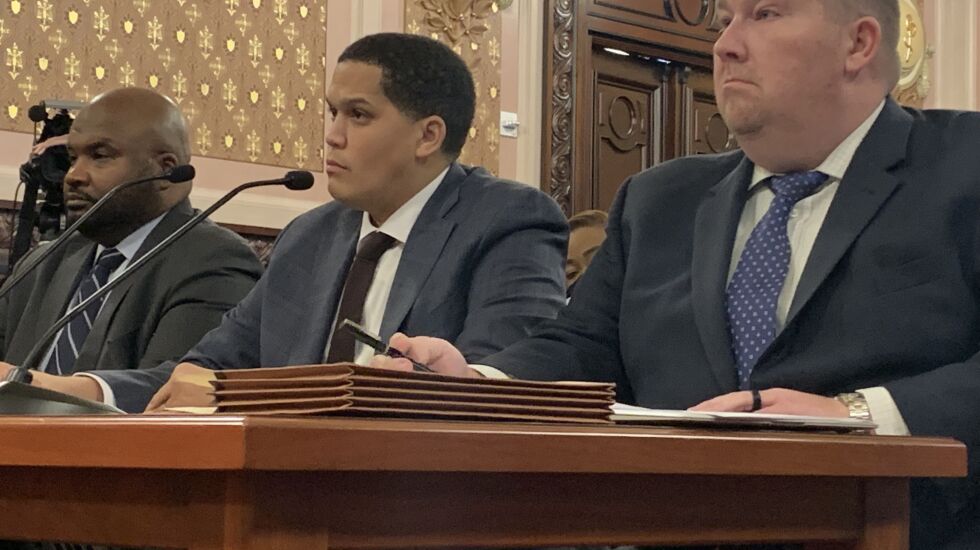SPRINGFIELD — After months of heated rhetoric and TV ads over the controversial SAFE-T Act, Illinois Democrats on Thursday handily approved changes to the measure, including adding felonies and crimes such as kidnapping and arson to the charges that qualify someone to be detained while awaiting trial.
The revisions would also set up an option for those already in jail to request to be under the new no-cash bail system.
The Illinois Senate voted 38-17 to approve amendments to the new law — and the Illinois House later voted 71-40 to concur.
Democrats for weeks said they planned on tweaking and clarifying the measure that includes ending cash bail on Jan. 1 — but not overhauling it, despite resistance from some states’ attorneys and Republicans.
The new law was used as political fodder during the contentious election cycle that ended last month — but the criticism and complaints did help to spotlight some areas of the legislation that Democrats agreed required clarification.
Most of the revisions approved by legislators on Thursday were described as attempts to clear up misconceptions about the original intent of the legislation — not significant additions or subtractions.

Among the most overt changes is that those charged before Jan. 1 would be able to remain in the old bail system — or request to be moved to the new system.
A portion of the SAFE-T Act called the “Pre-trial Fairness Act” eliminates cash bail starting Jan. 1. Under the legislation signed into law last year, for those charged after the start of the year, judges would decide who remains locked up while awaiting trial, rather than requiring defendants to pay bail to be released from jail. The decision would be based on the crime and whether the defendant was considered a threat to safety or likely to flee.
The original intent of the law was to have it applied to people detained prior to Jan. 1. But some argued that was unclear. The new changes provide guidance for those previously detained.
Under the proposed changes that passed the Senate and House on Thursday, defendants already in jail — and prosecutors — would be able to petition for a hearing to determine whether those defendants should be released.
That petition can be denied. But those with the lowest level offenses, such as shoplifting, must have a hearing within seven days of a request. For those considered a flight risk, a hearing would be held within 60 days and for those considered to be potential threats to safety, hearings must be held within 90 days.
Critics of the initial measure also took issue with a provision that required police to ticket, rather than arrest, people for some misdemeanors, including trespassing.
Democrats said the provision always allowed for police to be able to arrest someone for trespassing — but sponsors said new language was included in the revisions to “clarify the intent” of the language in the original bill.
Police can arrest someone for trespassing if the person poses a threat to the community or any person and if the accused has a medical or mental health issue that poses a risk to their safety.
Other changes include providing consistency for what prosecutors must show to detain someone on grounds the individual is a threat. A “dangerousness standard” would mean a person poses a real and present threat to any person or persons or the community, based on the specific facts of the case.
The new proposal also expands the list of crimes in which someone can be denied pretrial release, now including arson, second-degree murder and kidnapping.
An amendment to the measure that cleared both chambers also defined “willful flight” to stress that the intent is to detain those who are actively evading prosecution, not someone who simply failed to appear in court. It also clarifies that judges can issue arrest warrants or summons when someone misses their court date.

State Sen. Darren Bailey, R-Xenia, called Senate debate over the measure part of “the most frustrating and disgusting, embarrassing day in history.” He argued that Republicans, and the public, had no say in the new legislation.
“It’s a slap in the face to every voter. It’s a slap in the face to every business owner. It’s a slap in the face to every police officer,” the former GOP gubernatorial nominee said. “It’s a slap in the face, even to our states’ attorneys who obviously don’t have a voice here.”
But state Sen. Elgie Sims, the South Side Democrat who sponsored the bill, countered that Republican states’ attorneys were in the room for extensive negotiations about the measure. Sims noted the Illinois Fraternal Order of Police and other states’ attorneys organizations no longer oppose the measure.
“This is a good piece of legislation. This is the result of hours of testimony, hours of negotiation, hours of work by individuals they say they support,” Sims said of the Republicans.
“Now you have domestic violence survivors, domestic violence advocates, crime survivors’ advocates say they support this piece of legislation. And they’re still not happy. ... This is a product of good work.”
During House debate, outgoing Illinois House Republican Leader Jim Durkin, R-Western Springs, and House Republican Leader-elect state Rep. Tony McCombie, R-Savanna, both emphasized their concerns that young victims might have to appear during bond hearings, an issue they raised in debate in the initial measure. McCombie said the new changes “prioritize criminals over victims.”
But bill sponsor state Rep. Justin Slaughter said the revisions to the measure had been cleared by victims’ rights advocates.
The Cook County Public Defender’s office celebrated the passage of the measure, calling it a “victory for pretrial fairness.”
“We are immensely proud of the joint work by advocacy and community groups, lawmakers, stakeholders from every part of government, faith-based organizations and system partners who fought back against fearmongering and misinformation and preserved the essence of this landmark justice reform,” Cook County Public Defender Sharone R. Mitchell, Jr. said in a statement.
Champaign County State’s Attorney Julia Rietz, head of the bipartisan Illinois State’s Attorneys Association, testified before the Illinois Senate Executive Committee that the organization took a neutral position on the new bill, but had previously opposed the initial measure.

Rietz acknowledged that she was “disappointed” with the original process in which the bill was passed, but didn’t oppose the new measure because of some of the tweaks, including the changing of language when it comes to willful flight.
“All in all we believe this is a good move forward on Jan. 1 when it comes to the original legislation,” Rietz said.
The roughly 60 SAFE-T Act lawsuits filed by Illinois state’s attorneys and sheriffs have all been consolidated before a judge in Kankakee County. That litigation is unlikely to be seriously affected by the new changes. Rather, the lawsuits revolve around whether the SAFE-T Act broadly aligns with the state constitution, both in its content and how it became law.







